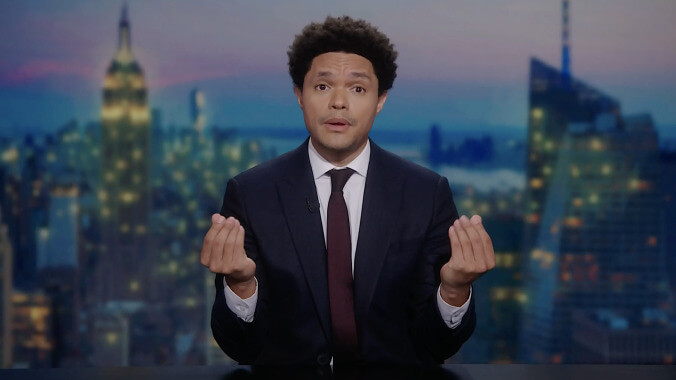Trevor Noah examines the real reason why you're getting pulled over so much
Unlike racial profiling, the quota system for traffic tickets is something even many police don't like

Tuesday’s Daily Show (still audience-free, although with host Trevor Noah back in his empty studio), took a look at an unjust police practice. And while there are so, so many of those to choose from, the abusive and arbitrary police tactic that Noah focused on was one even most police officers can’t get behind, in the form of the technically illegal in many jurisdictions (but still very likely to cost you unnecessary money and hardship) ticket quotas. As Noah noted in a segment loaded with incriminating news clips and interviews, the number of traffic and parking citations handed out in your town often has less/nothing to do with public safety, and way more to do with raising municipal cash.
The whole idea that cops are only writing you that citation because of a top-down mandate of lucrative daily traffic stops has long been a cliché. Noah also noted that making jokes about such a practice while getting a citation is one sure way to incur some extrajudicial wrath and/or violence from the ticket-writing officer, should you be the wrong skin tone. According to one Noah skit, the response, “Because your town is broke as fuck,” might be an accurate answer to a cop asking, “Do you know why I pulled you over?,” but it’s probably not a great idea. Still, some things pass into the realm of cliché because they are 100 percent, ubiquitously true, as Noah flagged multiple, verified examples of towns and police departments issuing their own arbitrary punishments (crappy vehicles, mandatory overtime, disciplinary write-ups) to officers who don’t meet the daily recommended intake of remunerative stops.
And, sure, in some states (New York, Illinois, California, even Florida, for crying out loud), setting mandatory ticket thresholds is illegal. But, apparently, all departments have to do in those states is to set a minimum daily number of required citations (aka quotas), and then include the phrase “this is not a quota” in every piece of departmental documentation. (Seriously, if you’re driving through Hopewell, Virginia, look out for that gerrymandered piece of interstate skirting the town that accounts for about half the police budget.)
According to Noah, this practice isn’t just unpopular with motorists, but with the rank-and-file police, too. Showing officers interviewed in various local news stories talk about how much they’d be rather doing anything else that writing endless and unnecessary tickets, Noah does bring up the double-edged sword of letting certain law enforcement officers do “what they would rather be doing.” Still, it’s a rare issue that can unite everyone from cops, to minorities, to Black Lives Matter activists, and plain old people just trying to drive to work without a potentially life-threatening police interaction. As Noah puts it, “nobody likes this.” And, while noting in an aside that, “Cops can’t even protest this. Because every time they try, they just beat themselves up out of habit,” Noah does offer up an alternative method of police-based revenue generation. However, the Daily Show commercial for “Uber Blue,” does suggest that a “92 percent” guarantee that riders will not be subjected to backseat police brutality might not inspire consumer confidence. Still, neither does the documented practice of needless police stops based on municipal greed, so, back to the drawing board.